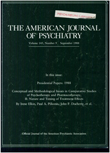Tricyclic nonresponders: phenomenology and treatment
Abstract
In an attempt to identify characteristics of tricyclic antidepressant nonresponders, the authors reviewed the records of inpatients with unipolar, nondelusional depression who had received adequate treatment (confirmed by plasma level determination) with tricyclics. The 17 patients who failed to respond were compared to a group of tricyclic responders with respect to demographic and phenomenologic variables. Although the nonresponders tended to have more previous episodes of depression and higher anxiety scores on the pretreatment Hamilton scale than the responders, they could not be distinguished from the responders by clinical or demographic data. All of the patients who failed to respond to tricyclics subsequently responded to monoamine oxidase inhibitors and/or ECT.
Access content
To read the fulltext, please use one of the options below to sign in or purchase access.- Personal login
- Institutional Login
- Sign in via OpenAthens
- Register for access
-
Please login/register if you wish to pair your device and check access availability.
Not a subscriber?
PsychiatryOnline subscription options offer access to the DSM-5 library, books, journals, CME, and patient resources. This all-in-one virtual library provides psychiatrists and mental health professionals with key resources for diagnosis, treatment, research, and professional development.
Need more help? PsychiatryOnline Customer Service may be reached by emailing [email protected] or by calling 800-368-5777 (in the U.S.) or 703-907-7322 (outside the U.S.).



